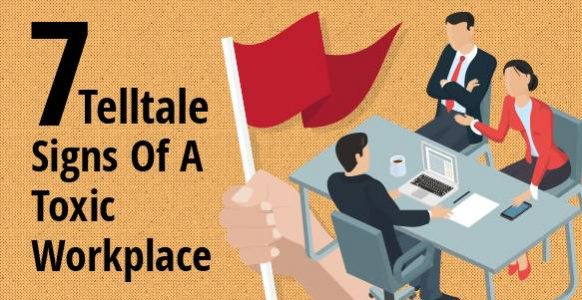Last updated: 6 August 2019

What’s your workplace like? Do you feel there’s a destructive culture that’s infecting everyone from the ground up? And if so, how do you identify a toxic workplace?
Depending on your work experiences to-date, you might not refer to an uncomfortable work environment as a toxic culture. So what might you say instead?
Here are some of the ways you could describe what’s going on (or things that you might hear other people say):
- There’s a bad atmosphere
- It’s a stressful environment
- There’s a high staff turnover
- People don’t trust each other
- There’s a lot of backstabbing
- Staff aren’t friendly or nice to each other
- People gossip about their colleagues
- There’s a lot of moaning and groaning
- Some staff admit that they hate their job
- Lots of people don’t like coming to work
It’s not unlikely that, in the course of your career (or careers), you could potentially work in a place where at least some of these things happen.
It can take a while for you to spot the signs as well, since you’ll probably be too busy making a good impression.
When you’ve been working in a particular place for some time, however, and when the dust settles, that’s when you might begin to pick up little signals that things are not all rosy in the business garden.
Apart from the things people say, what other types of signs should you be looking out for?
How To Identify A Toxic Workplace: Discover The 7 Red Flags To Watch Out For
The overall quality of your workplace can deteriorate if bad practices are evident and allowed to continue. These can include:
Red Flag #1 – A Lack Of Positive Feedback
Whether you’re working for an international organization or mowing lawns in your neighborhood, feedback is crucial.
And if the feedback you keep getting is positive, it’s going to make you do a better job. It’s going to give you confidence and fill you with enthusiasm.
If, on the other hand, all the feedback you get is negative, then it’s going to have the opposite effect. If a customer constantly complains that you didn’t cut the grass properly, despite your best efforts, that that’s going to make you reconsider whether or not you should continue working for them. And if you stop, then you both lose out.
Red Flag #2 –Too Much Red Tape

It can be difficult to get your work done when it takes days or even weeks for decisions to be made. Too many layers of bureaucracy can seriously slow things down or even bring them to a halt. And when that happens you lose momentum, you lose your focus, and you become less efficient and productive.
Ideally you want the freedom to make as many decisions as possible, because then you can get on with your job. That also shows that your manager or supervisor trusts you to make the right decisions, which is another way to build your confidence and ensure a better quality of work.
Red Flag #3 – Profits Come Before People
You know that businesses exist to make money, but you also know that the money made by any business is made by the people working there.
If a business looks after its staff, the business will prosper. If it doesn’t look after them, they’ll make less of an effort, take more time off, look for other employment, and the business will struggle to survive.
Red Flag #4 – Bullying Is Rife Throughout

Bullying can come from colleagues or from managers or supervisors. If you experience bullying in the workplace, it can lead to stress and anxiety.
It can make you dread coming to work each day. It can force you to keep quiet even when you think something’s wrong, because you know you’ll pay for it later.
Red Flag #5 – Lack Of Concern For Employee Welfare
This is linked to number 4. If you aren’t happy in your workplace, either because of bullying or because of other issues, then you’re not going to do a decent job. You’re not going to feel good about what you do and you’re not going to put in any extra effort.
If your boss or manager doesn’t try to make you happy in your work, then you will be more likely to experience stress, feel undervalued, and possibly burn yourself out.
That could lead to more time off work, which might ultimately lead to dismissal or the search for different employment.
Red Flag #6 – Blatant Favoritism
It’s no secret that people either click or they don’t. But if your boss constantly shows a preference for someone else’s work, it can make you feel underappreciated.
Alternatively, you may work in an environment where you are frequently pitted against other workers to reach a deadline or complete a task. While a bit of friendly competition can often help to spur you on, too much competition can stress you out, leave your nerves jangling over the side of your desk and make you want to pull your hair out.
There are also some things you can’t compete with, which makes it almost impossible to do your job well and demonstrate your skills properly.
Red Flag #7 – Unstable Work-Life Balance
Let’s face it: a job is just a job. When you’re not at work, you should be able to focus on other things. Things like your family, your friends, your hobbies and so on. But some employers expect more than that.
You may be unlucky enough to have the type of job where you are constantly on standby, always available.
Or you might have an employer who expects you to answer emails whenever you get them, whether you’re in the office or on holiday.
Then there are jobs where you are expected to work as many hours as possible, with little or no vacation time and no benefits for time off, even when you’re physically unable to get to work.
That’s a disaster waiting to happen, of course, because if you don’t burn out, you’ll make yourself ill, and in either case you’ll probably have to give up that job completely.
How Bosses Can Deal With Toxic Behavior In The Workplace

If you’re in charge, then the buck stops with you. If you want your business to flourish, then your employees have to flourish too.
That means creating the right atmosphere that’s conducive to them producing their best work. It means establishing a culture where they are able to engage and make contributions at every level.
Here are a few suggestions about how you can build and maintain that kind of culture.
- Get staff feedback regularly about their work environment, their managers, their workload, and anything that might affect their performance and productivity.
- Use the feedback to implement changes where possible, with more staff input.
- Praise and reward good staff members often to make sure they stay with the company.
- Give all staff the training they need to be able to do their jobs properly, including managers and supervisors.
- Create performance parameters and then measure them so staff can see where they are doing well and where they might need to work more efficiently.
- Promote positive attitudes and cultures by focusing on teamwork, mutual respect and courtesy.
When your staff are happy and feel valued, they’ll be less likely to engage in bullying, gossiping, backstabbing or sabotaging, because there will be no incentive to do so.
How Employees Can Deal With A Toxic Co-Worker

What’s a toxic co-worker? It’s someone who does everything they can to be destructive. Either they’re out to target you personally, or they’ve got some grudge – real or imagined – against the company. Either way, they can make your life difficult.
The most common things toxic co-workers do include the following:
- Looking out for number one
- Undermining fellow workers
- Spreading rumors
- Agreeing to carry out tasks and then not completing them
- Holding back information
- Blaming others for their mistakes
And that’s on top of the backstabbing, the criticizing, the gossiping and the tale-telling they might also engage in. To make matters worse, they’re not doing it accidentally. Chances are they’re all too aware of the effect their behavior is having on the team and/or the company.
But can just one bad apple spoil the whole barrel? Potentially, yes, they can. Here’s why.
- They put the company in a bad light
- They constantly find fault with ideas and concepts
- They put people’s backs up so they become intimidated or disinterested
- Their behavior gives the wrong impression to new staff members who may think it’s acceptable and then adopt it themselves
There’s no doubt about it. Toxic co-workers revel in making a drama out of just about anything.
But even if they’re geniuses at what they do, you can’t let them get away with it, because otherwise they’ll bring the rest of the staff team down with them.
According to Abby Curnow-Chavez, co-author of The Loyalist Team: How Trust, Candor, and Authenticity Create Great Organizations, there are 4 steps you can take to disarm a toxic co-worker and turn the situation around. Let’s take a look at what these are:
1. Talk openly and honestly with them – does your cop-worker realize the effect they’re having? It might be that speaking to them will help to alleviate the situation. Give them feedback you’ve gathered from as many people as possible, just to make sure they don’t think it’s just you who has an issue with them.
2. Never stoop to their level – try to rise above any toxic behavior and set an example. Sometimes showing others the right way to behave can be enough to help them model their actions more successfully.
Stay focused on what your team is trying to achieve so that you don’t get distracted or side-tracked, which means the toxic co-worker will soon discover that their negative behavior has little or no effect.
3. Get management involved – explain the problem to your supervisor. Ask for advice and guidance. It might be possible for them to restate the company’s vision and best practices in literature and/or team meetings that will help to drive the more appropriate behaviors home.
4. Look after yourself – toxic culture getting you down? If you can’t change it, try to live with it. If you can’t live with it, ask for help from your boss or HR department. If nothing works, you might want to consider looking for another job.
Of course, not everyone is in a position where they feel they can speak up. Speaking up could actually make matters worse for them. But why should it?
Why It’s Difficult To Speak Up About Toxic Work Environments
If you work in a toxic environment, then chances are there’s a lot of fear in the air. And if that’s the case, you won’t want to speak up and rock the boat. You’ll want to keep quiet and maintain the status quo, for fear that if you DO speak up, a number of things are likely to happen:
- Nothing will be done (in which case you might not even have bothered)
- You’ll be seen as a troublemaker
- You could lose out on any future promotions
- You could be reassigned to less meaningful or stimulating work
- You could be fired
According to HR expert, Liz Ryan, the reason why talented people leave their jobs is rarely to do with the work itself, or with their paycheck. The reason they pack it in is because they’re “tired of pushing a rock uphill” day after day after day.
She goes on to list 10 signs of a toxic culture that are easy to spot in any workplace:
- People don’t smile, laugh, joke or communicate
- Power is more important than personnel
- Staff are afraid to step out of line
- Workers and managers never interact
- Nobody is happy doing their work
- Mistakes are pounced on while success is ignored
- There are no opportunities for staff input
- Staff are scared to refuse any work, even when they think it’s silly or counterproductive
- Everyone is on edge and unable to relax
- There’s no sense of community
To wrap up:
In an ideal world, every place of work would be a good one. Somewhere you’d feel valued, respected, appreciated, rewarded, and given opportunities to learn, to grow and to acquire new skills.
For the record, the concept of a healthy work environment is not a new thing. It isn’t a modern-day fad for the technological generation. Even the ancient Greeks were aware of its importance, or as Aristotle put it: “Pleasure in the job puts perfection in the work.”
But you can’t have perfection or pleasure if there’s a toxic culture. If there’s bullying, harassment, or other forms of hostility. If the work you do is taken for granted. If your thoughts and suggestions are ignored. If your physical and mental well-being is neglected. Or if you’re afraid to make a contribution because it will be criticized, dismissed, or might even lead to some form of punishment.
If you recognize any of the signs of toxicity in your workplace, then be sure to take action. Either speak to your boss and discuss options or implement as many of the options yourself as you are able to. A healthy work environment makes happier employees, better products and services, more satisfied customers, and steady profits, so that everyone’s a winner.

